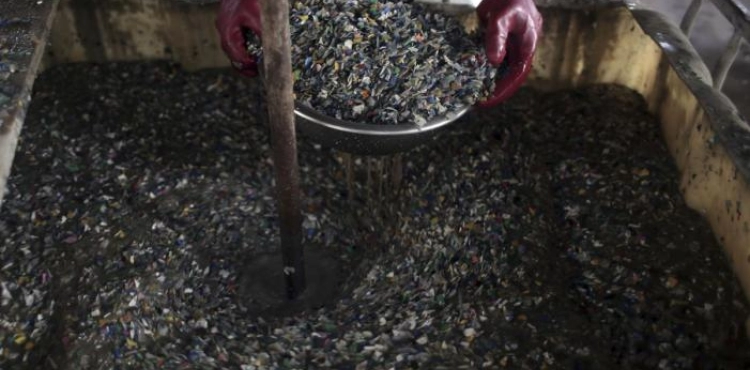For 8 hours straight, 7 workers gather in a small factory in the southern Gaza Strip to sort, clean and crush large quantities of plastic waste.
This mechanism is considered the first stage of recycling plastic waste in order to recycle it into many products that can be used again.
The owner of the factory, Mamoun Aslih, told Xinhua that plastic waste is sorted according to type, thickness and colors as well, explaining that this method is the basis of the process of crushing plastic.
Asleh (35 years), a father of three, added that he started this profession in 2006 after he failed to find a suitable job to help him with life´s difficulties, after Israel began imposing its blockade on the Strip.
At that time, Islah was not the only one looking for a job, especially with a marked increase in unemployment due to the instability of the political and economic conditions. Poor economic conditions pushed many young men to garbage bins to collect salable plastic and metals in an attempt to secure part of their daily expenses.
Aslih says, "Although the main goal was to obtain money, the situation has changed over time." "I became aware that there is a large proportion of inorganic waste, and it is non-degradable, which causes environmental damage, including plastics," he added.
"Therefore, I decided to help the community by getting rid of plastic, but in a correct way, by preparing it for the recycling process to ensure that it does not exist significantly in the environment to the detriment of people," he continues.
The average household waste in Palestine is about 716 tons per day, about 12 percent of which is plastic, according to a report issued by the Palestinian Central Bureau of Statistics in 2018.
Usually these wastes are dealt with by burning, which causes serious pollution in the air, and this is what encouraged the reformers and his workers to increase their work in breaking down plastic so that they may protect their environment from these pollutants.
Aslih says that his factory "has become a cornerstone of plastic recycling and a key part in protecting the environment," noting that he works on breaking down a few tons of plastic every week.
The 50-year-old, Ahmed Abu Teer, joined Islah for more than eight years in order to secure the daily expenses of his family. Abu Tir, a father of eight, says he is happy when he helps protect the environment from inorganic waste, which may cause health problems.
"There is a possibility that my colleagues and me will have some diseases, but we know that we have no other opportunity to make money under the current circumstances," he added, while a group of his colleagues mediate sorting the waste plastic, noting that he only makes about 40 shekels a day (one US dollar equals 3.2 Israeli shekels) .
More than 75 factories in the Gaza Strip rely on mashed plastic in their production lines, some of which produce chairs, toys, water hoses and gallons, while others produce mats, according to the Hamas-run Economy Ministry in Gaza.
Ministry spokesman Abdel Fattah Abu Musa told Xinhua that all factories that rely on recycled plastic are prohibited from producing tools that are used for human consumption, including household items.
Falah Odeh, the owner of the Haseer factory, says that 85 percent of the production lines in his factory depend on the crushed plastic waste that he buys from recycling factories and workshops.
Odeh, 50, adds that he was forced to rely on mashed plastic waste "due to the Israeli blockade and the deterioration of the economy, which affected various aspects of life in the Gaza Strip, and the deterioration of the financial situation due to the high cost of raw materials to operate the factory."
He points out that the price of a kilogram of raw plastic is estimated at about eight shekels, while the cost of mashed plastic does not exceed two and a half shekels after making adjustments to it.
The Gaza Strip, home to nearly two million people, suffers from many economic crises, on top of which is high unemployment rates, which are estimated at 49 percent, according to official Palestinian statistics.
Unemployment levels in the sector are among the highest in the world, given the population density according to the World Bank classifications.












